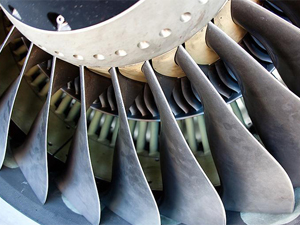



Date:13/04/16
 A group of scientists at the National University of Science and Technology MISIS in conjunction with scientists from Ufa State Aviation Technical University (USATU) developed innovative stationary blades for aircraft engines. These blades will be used in civil aviation to improve operational characteristics of engines, reduce total aircraft weight and lower fuel consumption.
A group of scientists at the National University of Science and Technology MISIS in conjunction with scientists from Ufa State Aviation Technical University (USATU) developed innovative stationary blades for aircraft engines. These blades will be used in civil aviation to improve operational characteristics of engines, reduce total aircraft weight and lower fuel consumption.
Currently, aircraft engineers and materials scientists worldwide are dealing with two imperative tasks: how to reduce total aircraft weight and how to increase specific strength of aircraft materials. At the request of JSC UFA Engine Industrial Association (UMPO in Russian), a group of scientists from NUST MISIS and USATU set to work on these tasks and developed a new generation of stationary blades for gas turbine aircraft engines.
This is the first time that stationary blades have been cast from titanium aluminide alloys in Russia. It is technically challenging to make a workpiece from intermetallic titanium alloys because they have no plasticity when transitioning from liquid to solid state. The specialists successfully found the necessary ratio of alloy components, determined the optimum casting temperature, designed a sprue, calculated its parameters and eliminated resistance of the mold to shrinkage during solidification. The stationary blades were developed for aircraft engines' turbines of high and low pressures. Made from intermetallic titanium alloys, they are twice as light as the nickel-based analogs that are currently being used in aviation.
As the turbine is equipped with a very large number of stationary blades, transition to the new technology will significantly reduce the weight of the engine. Reduction of total aircraft weight will allow aircraft to carry more passengers or cargo over long distances. In addition, the new blade production technology will significantly reduce effective centrifugal stress in the compressor and turbines of aircraft engines, as well as lower the inertia of turbines and compressors. All these factors will improve operational characteristics of aircraft engines, reduce specific fuel consumption and consequently reduce emissions of greenhouse gases into the atmosphere.
Russian scientists develop new generation of stationary blades for aircraft engines
 A group of scientists at the National University of Science and Technology MISIS in conjunction with scientists from Ufa State Aviation Technical University (USATU) developed innovative stationary blades for aircraft engines. These blades will be used in civil aviation to improve operational characteristics of engines, reduce total aircraft weight and lower fuel consumption.
A group of scientists at the National University of Science and Technology MISIS in conjunction with scientists from Ufa State Aviation Technical University (USATU) developed innovative stationary blades for aircraft engines. These blades will be used in civil aviation to improve operational characteristics of engines, reduce total aircraft weight and lower fuel consumption.Currently, aircraft engineers and materials scientists worldwide are dealing with two imperative tasks: how to reduce total aircraft weight and how to increase specific strength of aircraft materials. At the request of JSC UFA Engine Industrial Association (UMPO in Russian), a group of scientists from NUST MISIS and USATU set to work on these tasks and developed a new generation of stationary blades for gas turbine aircraft engines.
This is the first time that stationary blades have been cast from titanium aluminide alloys in Russia. It is technically challenging to make a workpiece from intermetallic titanium alloys because they have no plasticity when transitioning from liquid to solid state. The specialists successfully found the necessary ratio of alloy components, determined the optimum casting temperature, designed a sprue, calculated its parameters and eliminated resistance of the mold to shrinkage during solidification. The stationary blades were developed for aircraft engines' turbines of high and low pressures. Made from intermetallic titanium alloys, they are twice as light as the nickel-based analogs that are currently being used in aviation.
As the turbine is equipped with a very large number of stationary blades, transition to the new technology will significantly reduce the weight of the engine. Reduction of total aircraft weight will allow aircraft to carry more passengers or cargo over long distances. In addition, the new blade production technology will significantly reduce effective centrifugal stress in the compressor and turbines of aircraft engines, as well as lower the inertia of turbines and compressors. All these factors will improve operational characteristics of aircraft engines, reduce specific fuel consumption and consequently reduce emissions of greenhouse gases into the atmosphere.
Views: 721
©ictnews.az. All rights reserved.Similar news
- The mobile sector continues its lead
- Facebook counted 600 million active users
- Cell phone testing laboratory is planned to be built in Azerbaijan
- Tablets and riders outfitted quickly with 3G/4G modems
- The number of digital TV channels will double to 24 units
- Tax proposal in China gets massive online feedback
- Malaysia to implement biometric system at all entry points
- Korea to build Green Technology Centre
- Cisco Poised to Help China Keep an Eye on Its Citizens
- 3G speed in Azerbaijan is higher than in UK
- Government of Canada Announces Investment in Green Innovation for Canada
- Electric cars in Azerbaijan
- Dominican Republic Govt Issues Cashless Benefits
- Spain raises €1.65bn from spectrum auction
- Camden Council boosts mobile security





















